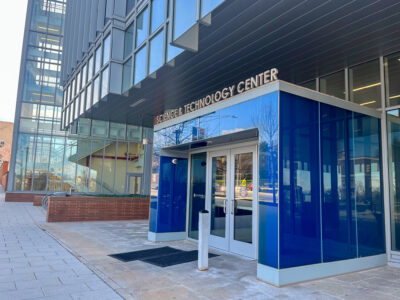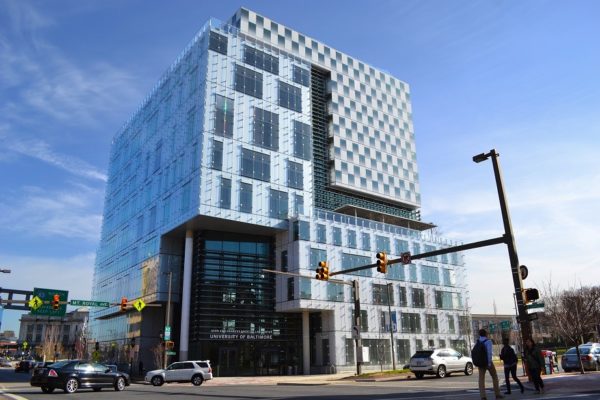“Neighborhoods care about everything, and we’re going to focus on everything,” said Seema Iyer about Baltimore Data Week, which returns next week from July 18-22.
Hosted by the Baltimore Neighborhood Indicators Alliance at the University of Baltimore’s Jacob France Institute (BNIA-JFI), the week-long event series will convene in person for the first time in three years.
Iyer, who heads the BNIA-JFI, stressed the continued importance of Baltimore Data Week as a data intermediary that helps communities interpret information.
“We are just here to serve the city neighborhoods without connection to any kind of political realm,” Iyer told Technical.ly. “All governments that have open data portals, we can help them with their engagement. We can help them with their communications. We can help them explain why this is relevant from a nonpartisan point of view — and then we’re here even beyond the election cycle.”
This yearly data conference began as a single day of programming, known as Data Day, in 2010 before expanding to a full week in 2020. This year’s event is hybrid, with virtual programs as well as two in-person days that are all accessible via Zoom. The format will allow virtual attendees to actively participate.
While most of the programming takes place Thursday and Friday, Baltimore Data Week will offer sessions every day of next week except Tuesday — Maryland’s primary election day.
Programs to note
Iyer pointed tech-minded professionals to Thursday’s offerings, which include an overview of how to use the State of Maryland’s Open Data Portal and context on the state bill that led to the portal’s creation (10:00-11:00 a.m.). Another session (11:20 a.m.-12 p.m.) showcases the Maryland Access to Justice Commission’s newly launched Housing Data Dashboard, which consolidates and visualizes eviction cases to make it easy to see monthly and yearly trends, as well as compare across counties and against statewide numbers.
The agenda is developed out of expressed need, says Iyer. For example, the Enoch Pratt Free Library will deliver a grants workshop (2:30-3:30 p.m.) that covers how community organizations can find and apply for grants to support their data initiatives.
Friday’s programming is solutions-oriented, beginning with the State of Baltimore’s Neighborhoods: Introduction to Vital Signs 20 and the Baltimore Community Change Project (9:30-10:15 a.m.). This session will preview Vital Signs 20, a report on yearly changes in data indicators of community wellness, and introduce the Baltimore Community Change Project, a community data collaboration that includes a set of six reports that analyze a 10-year loss in Baltimore’s population and changes in racial disparities, housing affordability, transportation accessibility, community connectedness, overall quality of life and building occupancy.
The findings were released earlier this year and presented to community leaders and residents in March, when BNIA-JFI offered over 100 community and cross-neighborhood solutions to issues highlighted in the data.
These solutions will be presented to conference-goers during that presentation, which is followed by Using Data to Inform Urban Problem Solving (10:15 a.m.-12:15 p.m.).
“What we’ve found through the Baltimore [Community] Change Project is that everything matters to neighborhoods, so instead of choosing one topic to talk about, we’re going to hear about tangled titles in Philadelphia, digital connectivity, access to affordability and health disparity,” said Iyer.
Another new feature this year is the much-anticipated UnConference on Friday afternoon (1:00-2:30 p.m.). The format allows anyone who wishes to facilitate or lead a discussion to submit ideas, with attendees voting on what to discuss. The BNIA-JFI is still accepting proposals for topics via this web form. Iyer noted that the BNIA-JFI already received submissions on the city’s Department of Planning’s data and maps, interactive climate change data and data journalism.
While the event always aims to center residents of Baltimore, Iyer acknowledged that they can be the hardest to reach — especially since the pandemic. To reconnect with communities, the BNIA-JFI this year hired a civic engagement and communications specialist to specifically reach out to and reactivate Baltimore residents. Iyer expects a lower in-person turnout than in previous years when they normally hosted 300 people at Data Day. Organizers have planned for space to accommodate 75-80 in-person participants.
Recordings will be available online following the event. Baltimore Data Week also plans to release resource guides including any learnings that come from conversation.
Check out the full agenda and register for individual panelsJoin the conversation!
Find news, events, jobs and people who share your interests on Technical.ly's open community Slack

Baltimore daily roundup: Real estate deal in the Peninsula; Missing $100M nitrile glove factory; Dirt bike clampdown

Baltimore daily roundup: Gen AI's software dev skills; UpSurge Tech Ecosystem Report; MD service year program

Baltimore daily roundup: Mayoral candidates talk tech and biz; a guide to greentech vocabulary; a Dutch delegation's visit


